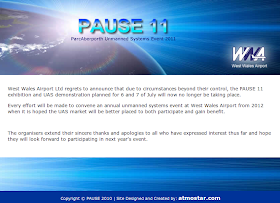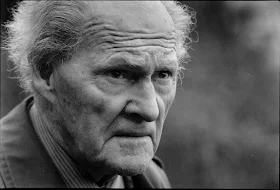Octavia Paz was born Octavio Paz Lozano in Mixcoac, Mexico, then a small
town, but today part of Mexico City on this day 31 March 1914. His parents were Octavio Paz
Solorzano and Josefina Lozano. His maternal grandparents immigrated to
Mexico from Spain.
The Paz family was a prominent family and part
of the Mexican elite. His father and grandfather were active supporters
of the Emilio Zapata revolution against President Porfirio Diaz's
regime. His father was instrumental in the agrarian uprisings against
the Mexican government and so was not around much during Paz's youth.
Paz was raised by his mother, aunt and paternal grandfather, Ireneo Paz, a liberal, intellectual novelist and publisher.
His
grandfather was noted for having written the first Mexican novel with
an indigenous Indian theme. Both his father and grandfather were part of
the progressive / leftist intelligensia of Mexico at the time.
When
Zapata was assassinated, the family fled to Los Angeles, California for
about a year until the situation cooled off when Paz was five years
old.
Growing up, Paz was introduced to literature early in life
through his grandfathers immense library filled with classic Mexican and
European literature. He read from a young age and these books
influenced his later poems and essays. His formal education was at
Colegio Williams that he attended until graduation.
During the
1920s, Paz was mostly influenced by Spanish poets, Gerardo Diego, Juan
Ramon Jimenez and Antonio Machado in his readings and writings of
poetry.
He first published poems as a teenager in 1931 and was
greatly influenced by D. H. Lawrence. Two years later, at nineteen years
of age, he published Luna Silvestre (Wild Moon) a collection of his poetry. He went on to publish many
more collections of poetry, including “Piedra de sol” (Sunstone), which
is considered one of his greatest works.
In 1932, he founded his first literary review magazine, Barandal.
After
graduating from the Colegio Williams went on to study law, but
abandoned his law studies in 1937 because as a young Marxist he preferred to teach the sons
of peasants and workers in the city of Merida in the Yucatan Peninsula.
He was following in the progressive and leftist influences of his
father and grandfather.
It was here in Merida that he began working on the first of his long, ambitious poems, Entre la piedra y la flor (Between the Stone and the Flower)
which was published in 1941. These poems described the situation of the
Mexican peasant under the thumb of the greedy landlords of the day.
These poems were greatly influenced by poet, T.S. Eliot.
At the invitation of Pablo Neruda, Paz traveled to Valencia, Spain
in 1937 to join the Second International Congress of Anti-Fascist
Writers during that country's brutal
civil war. Here Paz's writings and sympathies were with the Republican
side of the war and against Franco and fascism. He spent a year there before going to Paris, where he
advocated for the Spanish Republic. He met poets W.H. Auden, Stephen
Spender, Antonio Machado, Tristan Tzara, and of course Neruda. The
civil war steered his poetry into a short-lived social realist mode,
perhaps his first attempt to join words and action. “Elegy for a Friend Dead at the Front in Aragon” and “Ode to Spain”
stand out as examples of this effort; the former addresses Paz’s
“comrade” and finds brief moments of felicity in the psychology of grief
and loss, asking, “What fields will grow that you won’t harvest? /
What blood will run without your heirs? / What word will we say that
doesn’t say / your name, your silence, / the quiet pain of not having
you?” Paz also became known for “No Pasaran,” or “They Will Not Pass,” a
call to arms in verse that caused a minor sensation.
When he returned to Mexico in 1938, Paz co-founded another literary journal, Taller (Workshop)
and wrote for this journal until 1941. This journal highlighted the
emergence of a new generation of writers in Mexico along with a new
literary sensibility.
Then, Paz received a Guggenheim Fellowship
to study in the U.S. at the University of California at Berkley. Here he
became immersed in Anglo-American modernist poetry.
When he
returned to Mexico two years later, he joined the Mexican diplomatic
service, working in New York City for a while. He remained in diplomatic
service for Mexico for the next twenty years as he wrote his poetry and
essays.
In 1945 he was sent to Paris to work as a diplomat and here wrote his definitive and great book length essay, El Laberinto de la Soledad (The Labyrinth of Solitude) (1950) This book was an intense look and analysis of modern Mexico and the Mexican personality.
In addition to his poetry, Paz was a prolific essayist, writing on a
wide range of topics including politics, culture, and art. His essays
are known for their insight and originality, and he was a leading
intellectual in Mexico and the Spanish-speaking world.
Paz’s work was deeply influenced by his experiences as a diplomat. He
served as Mexico’s ambassador to India from 1962 to 1968, and his time
in India had a profound impact on his writing, inspiring many of his
most famous works.
He made contrary marks on history.
Acting against the excesses of his own government in 1968, at the time
of the Olympic Massacre in Mexico City, he renounced his ambassadorship
in New Delhi and became a focus of opposition. Twenty years before, he
published and analysed news of the Soviet labour camps, turning
left-leaning Latin American writers virulently against him. Although his critics
described him as a neoliberal or conservative thinker, Paz's roots were on
the left, and he maintained a strong attachment to socialist ideals
until the very end of his life.
When Octavio Paz died on 19 April 1998 in Mexico City, Mexico of cancer of the spine in 1998 his passing was
mourned as the end of an era in Mexico. Paz's
literary career helped to define modern poetry and the Mexican
personality. When Octavio Paz died Mexico lost a tribe of writers. He
was many poets, from being the surrealist disciple of André Breton to the
admiring imitator of Alexander Pope, alongside being an autobiographer and confessional writer. A social critic, a philosopher, translator, essayist
and a brilliant editor, urgently alive in and to his time.
Octavio Paz’s literary contributions have earned him numerous awards and honors, as well as a lasting legacy. In addition to the Nobel Prize in Literature, which he was awarded in 1990 Paz received many other awards and honors throughout his career. He was awarded the
Cervantes Prize, the highest literary honor in the Spanish-speaking world, and the Neustadt International Prize for Literature, among others.
Paz’s legacy as a writer, poet, and intellectual is marked by his
profound influence on Mexican and Spanish-language literature, as well
as his impact on global literary culture. His writing celebrated for its beauty, complexity, and depth continues to inspire
writers and readers around the world, and his ideas and insights into
culture, politics, and the human condition remain relevant and important
today. He is important because his writings appeal to readers of diverse backgrounds.
Paz
considered himself first and foremost a poet. He lived during an era
where his early poetry was influenced by Marxism, surrealism,
existentialism, Buddhism and HInduism. His later poetry dealt with love,
eroticism, the nature of time and Buddhism.
As a poet, Paz was of
the belief that poetry constituted "the secret religion of the modern
age" and for Paz it was "the revolution of the word is the revolution of
the world and that both cannot exist without the revolution of the body
. . . "
His poetry has been collected in two great collections: Poemas 1935-1975 (1980) and Collected Poems 1957-1987 (1987). I will end this post with the following brilliant essay by him.
Poetry and History - Octavia Paz
Every poem is an attempt to reconcile history and poetry for the benefit of poetry. The poet always seeks to elude the tyranny of history even when he identifies himself with the society in which he lives, and when he participates in what is called ' the current of the age' - an extreme case which is becoming less and less imaginable in the modern world. All great poetic experiments - from the magic formula and the epic poem to automatic writing - claim to use the poem as a melting-pot for history and poetry, fact and myth, colloquialism and imagery, the date which can never be repeated and the festivity, a date which is alive and endowed with a secret fertility, ever returning to inaugurate a new period. The nature of a poem is analogous to that of a Fiesta which, besides being a date in the calender, is also a break in the sequence of time and the irruption of a present which periodically returns without yesterday or tomorrow. Every poem is a Fiesta, a precipitate of pure time.
The relationship between men and history is one of slavery and dependence. For if we are the only protaganists of history, we are also its raw material and its victims: it can only be fulfilled at our expense. Poetry radically transforms this relationship; it can only find fulfilment at the expense pf history. All its products - the hero, the assassin, the lover,the allegory, the fragmentary inscription, the refrain, the other; the involuntarily exclamation on the lips of the child at play, the condemned criminal, the girl making love for the first time; the phrase borne of the wind, the shred of a cry - all these, together with archaism, neologism, and quotation, will never resign themselves to dying, or to be battered against the wall. They are bent on attaining to the end, on existing on the utmost. They extricate themselves from cause and effect. They wait for the poem which will rescue them and make them what they are. There can be no poetry without history, but poetry has no other mission than to transmute history. And therefore the only true revolutionary poetry is apocalyptic poetry.
Poetry is made of the very substance of history and society - language. But it seeks to re-create language in accordance with laws other than those which govern conversation and logical discourse. This poetic transmutation occurs in the innermost recesses of the language. The phrase- and not the isolated world- is the cell, the simplest element of language. A word cannot exist without there words, a phrase without other phrases.
That is to say, every sentence always contains an implicit reference to another, and is susceptible of explanation by another. Every phrase constitutes a 'wish to say' something, referring explicitly to something beyond it. Language is a combination of mobile and interchangeable symbols, each indicating 'towards' what it is going. In this way both meaning and communication are based on the 'intentionality' of words. But no sooner does poetry touch them that they are changed into rhythmic units or into images; they stand on their own and are sufficient unto themselves. Words suddenly lose their mobility, there are various ways of saying a thing in prose, there is only one in poetry. The poetical word has no substitute. It is not a
wish to say something, but is something
irrevocably said. Or alternatively, it is not a 'going towards' something, nor a 'speaking' of this or tat. The poet does not speak of horror or of love: he shows them. Irrevocable and irreplaceable, the words of poetry become inexplicable except in tears of themselves. Their meaning is no longer beyond, but within tem; the image is 'in' the meaning.
The proper function of the poetic image is to resolve into a unity realities which appear to us conflicting and irreducible. And this operation takes pace without removing or sacrificing the conflicts and antagonisms between the entities which it evokes and re-creates. That is why the poetic image is inexplicable in the strict sense of the term. Now poetic language partakes of the ambiguity with which reality reveals itself to us. In transmuting the language, the image not only opens the door to realty, it also, as it were, strips realty bare and shows it to us in its final unity. The phrase becomes an image. The poem is is a single image, or an indivisible constellaion of images. The void left by the dissapearance of what we call reality is peopled with a crowd of heteroeneous or conflicting visions, inevitably seeking to resolve their discord into a solar system of allusions - the poem: a universe of opaque, corruptible words which can yet light up and burn whenever their are lis to touch them. At certain times, in the mouths of some speakers, the phrase-mill becomes a source of evident truths requiring no demonstration. Then we are transported into the fullness of time. By exploiting language to the utmost the poet transcends it. By emphasising history, he lays it bare and shows it for what it is - time.
When history allows us to suspect that it is perhaps no more than ghostly procession, without meaning or end, ambiguity of language becomes more marked and prevents any genuine dialogue. Words lose their meaning,and thereby their powers to communicate. The degradation of histpry into a mere sequence of events involve the degradation of language, too, into a collection of lifeless symbols. All men use the same words, but they do not understand one another. And it is useless for men to try to 'reach an agreement' on the meanings of words. Language is not convention, but a dimension from which man cannot be seperated. Every verbal adventure is total; a man stakes his whole self and life on a single word. The poet is a man whose very being becomes one with his words. Therefore, nly the poet can make possible a new dialoque. The destiny of the poet, particularly in a period such as ours, is 'donner un sens plus pur aux mots de la tribu.' This implies that words are rooted out of the common language and brought to birth in a poem. What is called hermeticiism of modern poetry spins from that fact. But works as inseperable from men. Consequently, poetic activity cannot take place outside the poet, in the magic object represented by the poem; rather does it take man himself, not in the poem alone. The two are inseperable. The poems of Rimbaud are Rimbaud himself, the adolescent fencing with shining blasphemies, despite all attempts to convert him into a kind of brute upon whom the word descended. No,
poet and his word are one. Such has been, during the past hundred years the motto of the greatest movement of the century - surrealism - been any different. The grandeur of these attempts - to which no poet worthy of the name can be indifferent - lies in their endeavour to destroy once and for all, and in desperation, the dualism which tears us asunder. Poetry leaps into the unknown, or it is nothing.
In present circumstances, it may seem ludicrous to the extravagent claims of poetry. Never has the domination of history been greater than now, never has the pressure of events' become so suffocating. In proportion as the tyranny of 'what to do next' becomes more and more intolerable - since our consent has not been asked for the doing, and since it is almost always directed towards man's destruction- so does poetic activity become more secret, isolated, and rare. Only yesterday, to write a poem or to fall in love were subversive activities, compromising the social order by exposing its double character. Today, the very notion of order has disappeared, and its place has been taken by a combination of forces, masses, and resistances. Reality has cast disguises and contemporary society is seen for what it is: a hetegeneous collection of things 'homogenized' by the whip or by propaganda, directed by groups distinguishable from one another only by their degrees of brutality. In these circumstances, poetic creation goes into hiding. If a poem is a Fiesta, it is one held out of season, in unfrequented places - an underground festivity.
But poetic activity is rediscovering all its ancient subversive powers by this very secrecy, impregnated with eroticism and the occult, a challenge to an interdict not less condemnatory for not being explicitly formulated..
Poetry, which yesterday was required to breath the free air of universal communion, continues to be an exorcism for preserving us from the sorcery of force and its numbers. It has been said that poetry is one of the means by which modern man can say
No to all those powers which, not content with disposing of our lives, also want to rule our consciences. But this negation carries within it a
Yes which is greater than itself.
Reprinted from
Anthology of Mexican Poetry
Grove Press 1994
originally published , in an edition
by Thames and Hudson, 1959.






























